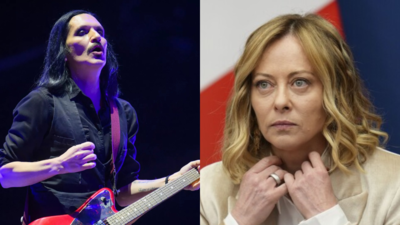A rock band artist has been charged with defamation after allegedly calling Italian Prime Minister Giorgia Meloni a “fascist” and a “Nazi” during a concert in Turin, the Telegraph reports.
The 52-year-old Placebo frontman Brian Molko made the remarks at the Sonic Park festival in 2023, where he reportedly also called Meloni a “piece of s***, fascist, racist.” His comments were met with backlash from Meloni’s far-right Brothers of Italy party, which has its roots in Italy’s neo-fascist movement.
Following a complaint from police present at the event, Turin prosecutors launched an investigation into Molko for defamation and contempt. On Monday, Italy’s justice ministry approved the prosecutors’ request to officially charge him.
Defamation in Italy is a serious offence that can carry a prison sentence of up to three years. However, a spokesman for justice minister Carlo Nordio indicated that a prison term is unlikely in this case. If found guilty, Molko is expected to face a fine of approximately €5,000 (£4,200).
Italy’s criminal code penalises anyone who “publicly defames the republic,” which includes the government, parliament, courts, and the army.
Molko is not the first person to face legal action for criticising Meloni. In 2023, journalist Roberto Saviano was found guilty of defamation and fined just over $1,000 for calling Meloni a “bastard” in response to her hardline stance on migration.
Similarly, in July 2024, an Italian judge ordered journalist Giulia Cortese to pay Meloni €5,000 (£4,210) in damages for mocking her height on social media, ruling that it amounted to “body shaming.” Cortese, who was also given a suspended fine of €1,200, condemned the ruling, accusing the Italian government of restricting free speech.
“This country seems to get closer to Orbán’s Hungary,” she wrote on X. “These are bad times for independent journalists and opinion leaders. Let’s hope for better days ahead. We won’t give up!”
In another case, Meloni previously sued a historian who allegedly called her a “neo-Nazi in her soul” in 2022. However, she later dropped the lawsuit.
The case against Molko has reignited debates about free speech in Italy, with critics arguing that the government is using defamation laws to suppress dissent. While defamation laws exist in many countries, Italy’s approach to prosecuting public figures over political statements has drawn scrutiny.







